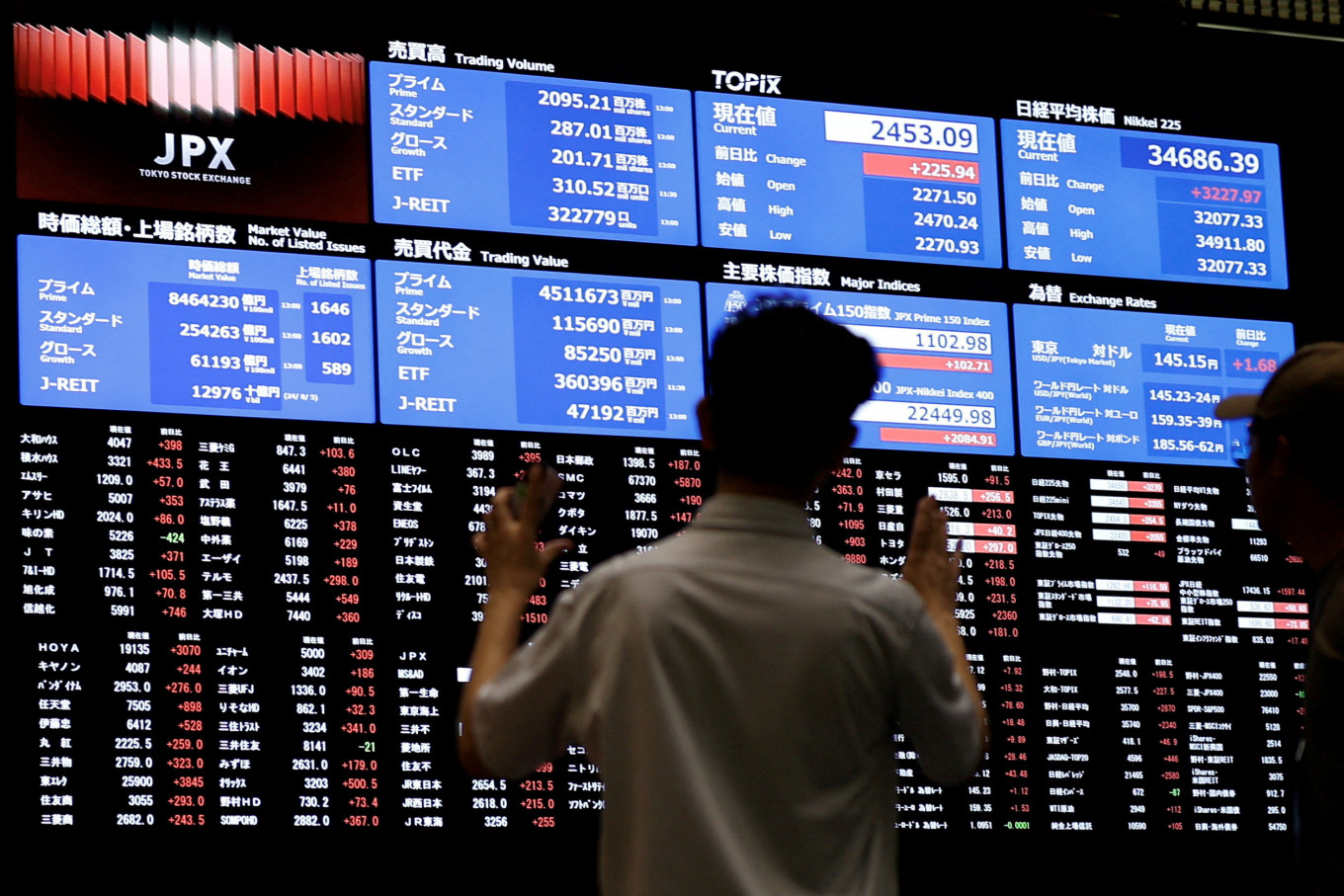Popular Reads
Top Results
Can't find what you're looking for?
View all search resultsPopular Reads
Top Results
Can't find what you're looking for?
View all search resultsOverseas investors turn bearish on Japanese equities after brutal sell-off
Global investors are turning bearish on once-favored Japanese stocks following last week's turbulence as they reassess economic prospects and the viability of yen-funded trades.
Change text size
Gift Premium Articles
to Anyone
G
lobal investors are turning bearish on once-favored Japanese stocks following last week's turbulence as they reassess economic prospects and the viability of yen-funded trades.
Using cheap yen to buy stocks on the Nikkei was a hot trade until this month. The Nikkei index had doubled since the start of 2023, and a tumbling yen had boosted returns for investors and companies.
That trade is being turned on its head by sudden volatility in the Japanese yen, Bank of Japan (BOJ) rate rises, doubts around Japan Inc.'s earnings and worries the US economy is stalling.
The CSOP Nikkei 225 Daily Double Inverse exchange-traded fund – the only ETF outside Japan that allows bearish bets against the Nikkei index – saw a surge in its trading volume during the week ended Aug. 9.
Average daily turnover on the Hong Kong-listed product reached nearly HK$20 million (US$2.57 million), a 20-fold increase from previous week's roughly HK$1 million per day and the highest since its launch in May this year.
Investors are also exiting direct exposure to Japan.
Global hedge funds dumped Japanese equities at the fastest pace in more than five years during the Aug. 2 to Aug. 8 week, Goldman Sachs said, and even some long-term investors have started cutting exposure.
The BOJ's quantitative tightening and a strong yen will be headwinds for Japanese stocks, said Ben Bennett, head of investment strategy for Asia at LGIM, a London-based asset management giant.
The firm's multi-asset funds had turned underweight Japanese equities before last week, he said, adding they maintained that weighting after the volatile week.
Japanese stocks had their worst one-day sell-off since 1987 last Monday. Fears of a US recession and a surprise rate hike in Japan triggered a massive unwinding of billions of dollars of a popular yen carry trade that was financing the purchase of risk assets, including Japanese equities.
While the actual size of the unwinding remains uncertain, some analysts warn it has room to go, given expectations of yen appreciation and a spike in the CBOE Volatility Index.
The yen has surged from around 162 per dollar in mid-July to roughly 142 per dollar last Monday, its strongest level in seven months.
"One of the drivers of upside in Japanese equities is going to phase out," said Carlos Casanova, senior economist for Asia at Swiss asset manager UBP, referring to yen carry trades.
"Now we need to see an improvement in fundamentals, meaning that you need to see upward revisions in earnings. And that's not going to happen unless we see a recovery in the domestic economy," he said.
UBP has recently exited some positions in Japanese equities and now holds a neutral view.
Zuhair Khan, Tokyo-based senior portfolio manager at UBP, said it was getting tougher to trade the Japanese market as the US interest rate cut path and the yen had both become harder to predict.
Markets, meanwhile, are waiting for data due this week on Japanese second-quarter economic growth and US inflation.
"No one wants to act rashly now," said Steven Leung, a Hong Kong-based executive director at UOB-Kay Hian. "Investors need to wait for important figures this week to draw a more informed conclusion about whether the sell-off in Japanese stocks is over."










